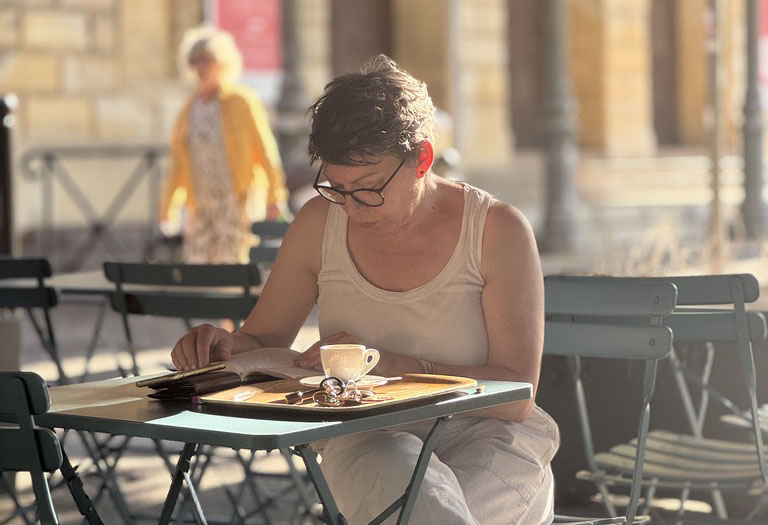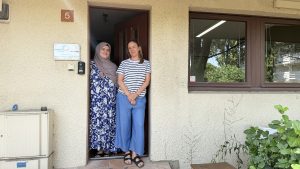
In Arles, it's not uncommon for cafe patrons to linger over a cup of coffee and read a book while ignoring their phones.
Text and photos by Zoe Dixon
As the sun rises in the small Provençal town of Arles, France, porcelain clinks are heard over the chirping of birds. Old men sip their espresso from tiny cups, in no hurry whatsoever. Passersby pause to admire blooming flowers, then continue on their way, unbothered by the lack of traffic or crowded sidewalks.
Meanwhile, mornings in major cities world-wide are a blur of commuters with briefcases, ordering to-go cups before dashing between obligations. Inside cafes, customers hunch over laptops, squeezing in emails before the next meeting. There’s no time, nor space, for flower-smelling.
While much of the world has embraced a faster, more digital cafe culture, mornings in Arles remain slow, still, present, and in that, a sort of ritual. Wi-fi is rare, friends linger on conversations, and coffees are finished before anyone stands to leave. Yet, change may be on the horizon, as younger generations begin to shape the morning scene. Digital habits are seeping into even the quietest corners of Arles, putting pressure on the sacred calmness that defines its early hours. So what makes Arles so resistant to modern tempo, and is that resistance sustainable in an era when each second is dedicated to productivity?
“Some coffee shops say no laptops are allowed here,” said Franny Martin, a 24-year-old Arlesian. “Or if laptops are allowed it’s only in a specific corner.”
Yet, even with cellular data, most customers are still in the present moment, without a phone in sight.
“It’s really like people speaking to people, rather than this commercial transaction kind of relationship you have with cafe owners and waiters in Paris,” said local Anouk Bouvet, 28.
Penny Orwant, a 20-year-old American who frequently visits Arles, noticed the absence of screen usage here. “Obviously in Paris, you’ll find more, like, internet cafes… but in most of France, the energy is just kind of like: sit, relax, talk to people, for, you know, more time. Just chill.”
But is this resistance to technology intentional, or simply a product of tradition?
“It’s not that we’re against Wi-Fi. It just never felt necessary,” said Elodie Moreau, a barista at a small café called Meinado. “People come here to talk, read, watch the street. Without screens, the cafe feels more connected in a different way.”
The pace of Arles may still be peaceful, but it is no longer untouched by the generational shifts. As cities grow, they become busier as youthful energy takes over the traditional tranquility.
“If people want to work, let them go to the office. Why would I need to rush when I have this,” laughed local Gerard Laurent, 71, as he stirred sugar into his espresso.
Laurent, along with many others, had been at that cafe until the morning slipped away. However, younger Arlesians are beginning to adopt the habits seen in larger cities around the world. The phone stays out longer as the coffee disappears faster.
Vivotto is one of the few cafes with Wi-Fi in Arles. Lou Gerault, a 20-year-old cashier there, said that “older people, especially, don’t really appreciate all the screens. For them, coffee is for talking, not working. But at the same time, I think a cafe like this one allows people to do what they want. You want to chat, you can; you want to work, you can. I like that.”
This freedom to sit, to speak, or simply to just exist allows people to have time with their own thoughts, and thus to process themselves in a way that rushed city culture can’t offer. And maybe that’s the magic of mornings in Arles; they give you back to yourself.





